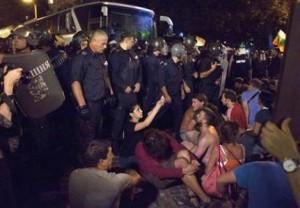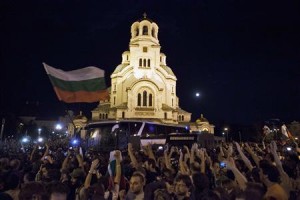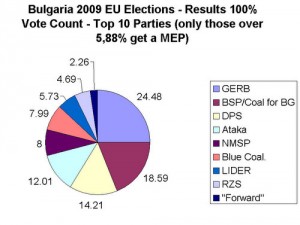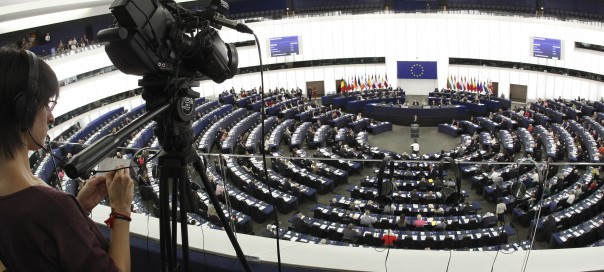2024 European Parliament election in Bulgaria
5 seats, 24.26% — The 2024 European Parliament election in Bulgaria will be held on June 9, 2024 as part of the 2024 European Parliament election. This will be the fifth parliamentary election since Bulgaria’s EU accession in 2007, and the first to take place after Brexit. Bulgaria will simultaneously hold a separate parliamentary election on the same day.
Since the pandemic in 2020, it has become customary that elections are held in Bulgaria twice a year regardless of the high cost for the country. It is expected that as in the previous 4-5 years, the second round of Parliamentarian elections will be held in October.

Government Elections in Bulgaria (2005-2022):
2005 Parliamentary Elections
2006 Presidential Elections
2007 Municipal Elections
2009 Parliamentary Elections
2009 European Parliament elections
2011 Presidential Elections
2011 Local Elections
2013 Early parliamentary elections
2014 Early Parliamentary Elections
2015 Municipal Elections
2016 Presidential election
2017 Parliamentary elections
2019 European Parliament election (23-26 May)
2019 Bulgarian local elections
2019 Municipal Elections
2021 April National Parliament election
2021 Second National Parliament election
2021 Third National Parliament and Presidential elections
2022 October elections for 48th National Assembly after the fall of a four-party coalition in June 2022.
2023 Bulgarian parliamentary election
Political row in Bulgaria over European Parliament migration resolution
Bulgaria’s largest parliamentary party GERB and the nationalist Patriotic Front coalition have launched verbal attacks on the opposition Bulgarian Socialist Party and the Movement for Rights and Freedoms, saying their MEPs backed a European Parliament resolution that effectively encourages illegal migration.
The 93-point resolution on human rights and migration in third countries was adopted by the European Parliament on October 25.
At a news briefing in the National Assembly, GERB MP Galia Zaharieva quoted extracts from the EP resolutio on the need “to avoid creating separate districts for migrants, by promoting inclusion and the opportunity to take up all the social opportunities on offer”; and that the EP “considers that migration is recognised globally as being a powerful tool for sustainable and inclusive development.”
Zaharieva said that the resolution indicated that migration was beneficial. At the same time, she hit out at the opposition parties, including the BSP, for being critical about the Bulgarian government’s handling of migration and she accused the opposition of being alarmist in making false claims about the migration situtation in Bulgaria.
Valeri Simeonov, co-leader of the nationalist Patriotic Front, a minority partner in the coalition government arrangement, said that the BSP and MRF MEPs who had backed the resolution should be withdrawn from their posts and replaced by others further down the lists.
Simeonov said that the EP resolution had been adopted by 339 to 333 votes, meaning that the votes of the Bulgarian MEPs had been crucial to it being approved. He described the resolution as “dangerous and harmful” to Bulgaria because the country was at the forefront “of this new war with migration”.
“We cannot accept as normal that, with furious anger and enthusiasm and the aggressive egomania of a rising folk music singer, the leader of the BSP travels Bulgaria, inspiring fear and terror in people that a refugee camp will be opened in every village, and at the same time, the representatives of the same party stand shoulder to shoulder, hand in hand, with the MRF to vote for a decision so harmful and dangerous to Bulgaria,” Simeonov said.
BSP leader Kornelia Ninova said that her party distanced itself from the resolution, which she described as inconsistent with the BSP’s policies. The MEPs would be asked next week to explain to a meeting of the BSP executive bureau why they had supported the resolution, Ninova said.
The row comes just more than a week before Bulgarians go to the polls in the first round of presidential elections, in which nationalists and socialist candidates have sought to make illegal migration and refugees a campaign issue.
After 40 days of protests police removes protesters from Parliament square in Sofia, Bulgaria
Comments Off on After 40 days of protests police removes protesters from Parliament square in Sofia, Bulgaria
Anti-government protests in Bulgaria’s capital have been going on for 40 days, and escalated Tuesday evening as several hundred demonstrators trapped the officials inside Parliament in a bid to oust the left-leaning government.
 (Reuters) – Hundreds of protesters built barricades around Bulgaria’s parliament, effectively trapping over 100 lawmakers, ministers, and journalists in the building for more than seven hours on Tuesday following a brief scuffle with police. Protesters pulled out sidewalk tiles and piled garbage bins to cut off roads to Bulgaria’s parliament, shouting “Mafia!” and “Resign!” and “Red Garbage!”, to keep the deputies under blockade until the Socialist-led government steps down. An earlier attempt to get deputies out of the parliament with a bus led to a scuffle with police. It was aborted after protesters threw bottles and other objects at the bus, while others sat in front of it.
(Reuters) – Hundreds of protesters built barricades around Bulgaria’s parliament, effectively trapping over 100 lawmakers, ministers, and journalists in the building for more than seven hours on Tuesday following a brief scuffle with police. Protesters pulled out sidewalk tiles and piled garbage bins to cut off roads to Bulgaria’s parliament, shouting “Mafia!” and “Resign!” and “Red Garbage!”, to keep the deputies under blockade until the Socialist-led government steps down. An earlier attempt to get deputies out of the parliament with a bus led to a scuffle with police. It was aborted after protesters threw bottles and other objects at the bus, while others sat in front of it.
 Thousands of Bulgarians have been protesting almost daily in Sofia since last month following a government decision to name a powerful media magnate as security chief, which many see as an example of private interests controlling state institutions. The government’s withdrawal of the appointment failed to quell public discontent in the European Union’s poorest country, which also is one of the bloc’s most corrupt. Seven protesters were treated for head injuries, the national radio said. Two police officers were also wounded.
Thousands of Bulgarians have been protesting almost daily in Sofia since last month following a government decision to name a powerful media magnate as security chief, which many see as an example of private interests controlling state institutions. The government’s withdrawal of the appointment failed to quell public discontent in the European Union’s poorest country, which also is one of the bloc’s most corrupt. Seven protesters were treated for head injuries, the national radio said. Two police officers were also wounded.
BULGARIA VOTES in the EU Parliament Elections
European Parliament Elections leave Bulgarian Evangelical Churches with no venue of political support.

As an EU member, Bulgaria voted in the EU Parliament Elections on June 6, 2009. After the 100% count, it was announced that GERB (new centrist party led by Sofia’s mayor Boyko Borisov) has won 24.48% of the votes with 627,693 votes. The Socialist Coalition for Bulgaria totaled 476,618 votes or 18.59%, the Turkish Movement for Rights and Freedoms (DPS) received 364,254 votes or 14,21%, the Nationalist Ataka got 307,985 or 12,01%, the National Movement for Stability and Progress (NMSP) of former Tsar and former PM, Simeon Saxe-Coburg, secured 205,145 votes or 8%, and the democratic Blue Coalition got 204,784 or 7.99%. Read more








